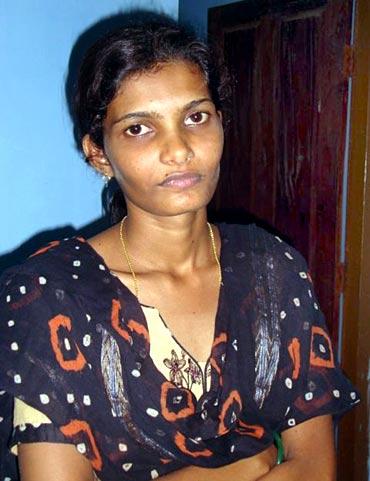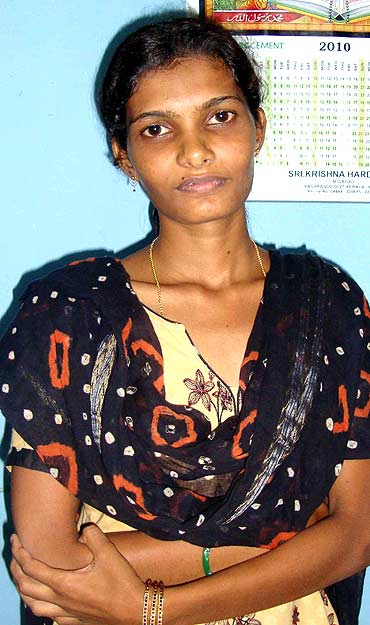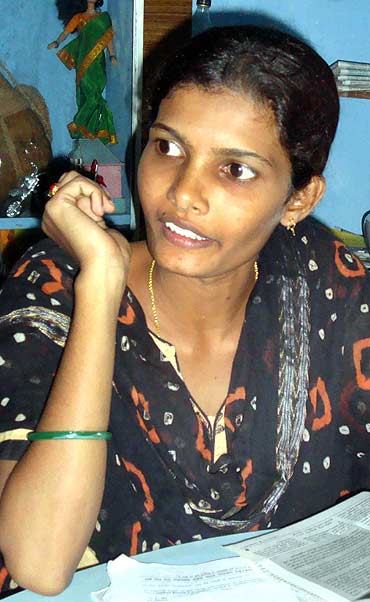 | « Back to article | Print this article |
Undaunted by death threats, she refuses to don a burqa
Rayana R Khazi, from a small town in Kasargod district in north Kerala, is unlike any other 22-year-old girl.
Unlike other girls in her village, she traveled to Chennai to pursue her dream of becoming an aeronautical engineer.
She is now preparing for the civil services examination and wants to be an Indian Administrative Services officer.
But she confronts death threats from fundamentalists in her community and been forced to stay home.
The reason: Rayana refuses to cover her head and wear a burqa.
But these threats and harassment have not daunted her fighting spirit. She tells Rediff.com's Shobha Warrier from Kasargod that her fight is not for her freedom alone, but for the freedom of her younger sisters and other young girls who have lost it.
Listen to the story of this courageous fighter:
Childhood
My mother came from a very conservative family where girls were not allowed to study. She was not even permitted to talk loudly. Even now, the situation is the same in my mother's family.
My father, a businessman, has not studied much; my mother had studied only up to the 4th standard. At the age of 14, she was married off.
I was born when she was 15 years old.
My mother started studying after she had children. Now, she is studying law! My mother would not have studied if my father was not like what he is. When people in the neighbourhood spoke ill of my mother because she went to study, I used to ask my father, 'How could you remain so indifferent to their rude comments?' His answer was just a smile!
My mother is my role model. If I have respect for any woman in this world, it comes from my mother. She hails from a family that does not grant any freedom to girls, but she used to tell me all the time that I should be able to stand on my own and be independent.
My parents have five daughters. I have seen my neighbours telling their daughters not to talk loudly as they are girls. But it was never like that in my family.
If my parents were not like this, I would not have been able to think independently and live courageously. I am proud of my parents.
My parents were sad about not receiving an education. They did not want that to happen to their daughters. Mother used to tell me, 'When I look back, I have no colourful memories, but I do not want that to happen to my children'.
After I received my education, I could see that other girls were made subservient by either their parents or relatives or other people.
When I look around, I also see that all girls and women are tied to rigid norms by either their parents or husbands or relatives or by the community.
I don't believe in purva janam (earlier life), but I feel that I might have done something good in my past life because I got such good parents, who have given me all the freedom in the world.
Do you think I will misuse the freedom given to me by such parents and bring unhappiness to them?
My parents are very, very religious. Sometimes I feel they are overly religious, but they have never imposed anything on us.
My father used to tell me that bhakti (faith) should come from within and if we did something because of pressure, it is not bhakti.
That was how I was brought up.
As told to Shobha Warrier
'I wanted to fly high in the sky'
I was a good student in school and my mother always encouraged me to study and stand on my own.
'Be independent', that is what she used to tell me always. It was a dream for me to study aeronautical engineering.
Like an aeroplane, I wanted to fly high in the sky!
Both my parents used to read a lot. You won't believe it, but my father used to talk to us about science all the time.
It was his stories that brought me closer to aeronautical engineering. I didn't get any other guidance from anyone.
Traveling to Chennai to study aeronautical engineering
No engineering college in Kerala offers a course in aeronautical engineering. Also, my mother used to tell me all the time that if you want to become somebody in life, you should go out of Kerala and see the world.
She used to tell me to come first in whatever I do.
After coming to Chennai, I learnt to travel alone. If you were to ask me whether I felt freer in the hostel, I would say no.
While I was a free bird at home, there were restrictions in the college hostel which I didn't like.
My parents never used to tell me that because I was a girl, I could not go out at eight in the night to have ice cream!
'Do you want to live or die? You can decide'
As I live in Chengala, a small village in Kasargod district, our relatives and other people from my community could not accept the fact that I, a girl, was permitted to go to college.
They got angrier when my father sent me to Chennai to study engineering. They just could not accept the fact that I was allowed to study and that too in a far-away city.
Another thing that they could not accept was that I came back home from Chennai wearing jeans and a t-shirt. That was totally unacceptable to the fundamentalists of the region.
They told me to cover my head with a dupatta, but I refused to do so.
Then they asked me to wear a burqa. They said that nothing except my eyes should be visible.
I refused to do that too.
First, they told me these things as if they were advising me.
When I refused to bow down to pressure, they started pestering me.
Then it became harassment.
My parents had always given me the freedom to choose what I felt was right but these people made my life miserable.
When I was brought up with all the freedom to choose what I wanted to do, why should I bow down to some fundamentalists?
When I did not obey them, they said, 'You are not obeying us because you have converted to Christianity and you are married to Jose.'
For these villagers, there are only three, four names in Christianity like Jose, Joseph, Thomas. Because I studied in a private engineering college in Chennai run by Christians, they started spreading the rumour that I was already married to a Jose!
They don't know that today's youngsters are not named Jose. None of my Christian classmates have first names like Jose or Joseph.
Because I wore jeans, they said, I had converted to Christianity as according to my village people, jeans is a Christian dress!
Some of my relatives even came with proposals to marry me off to men who have not even gone beyond primary school. But my parents put their foot down.
Enter the religious fundamentalists
The harassment became so strong that I could not even get out of my house.
They were so adamant that they screamed, 'Whatever it takes, we will make you wear a burqa'.
lso shot back that I would never ever wear the black dress.
They told me that women should not expose themselves for it creates desire in men.
I asked them, 'If men cannot control their desire, are women responsible for it?'
My question was construed as a condemnation of my religion by the fundamentalists.
They also said not wearing a burqa was condemnation of my religion.
I don't think that not wearing a burqa is condemnation of my religion.
I have read the Quran since my childhood and nowhere does it say that women should wear a burqa.
When I found the harassment unbearable, I sent a complaint to the Vanitha Commission (the Kerala Women's Commission). They called me for a sitting on July 4. The reports about the meeting appeared in the newspapers.
It was on July 9 that religious fundamentalists entered the scene. I started getting threatening calls and letters.
Even yesterday, I got a letter that said, 'Do you want to live or die? You can decide.' I got a threatening phone call saying the same thing.
The caller identified himself as the representative of the Popular Front of India.
If I bow down to their threats, they will do the same thing to other girls too, and that includes even my younger sisters.
I have decided to fight and not to get scared by the death threats.
Most of my classmates from school called me and offered me their silent support and prayers.
They said, 'We don't have courage like you. That is why we are in this black dress. None of us likes to cover ourselves like this. Even when we buy a new dress, what is the use? Who is going to see it? We have no choice. But you please continue fighting for us and for the coming generation.'
Here, a Muslim woman dresses herself only for her husband to see. She cannot go out in a dress that she loves.
All of us have dreams and aspirations, but these Muslim women are like caged birds.
I am not scared of anyone or any threats. You need to be scared only if you have done anything wrong and I have not done anything wrong.


